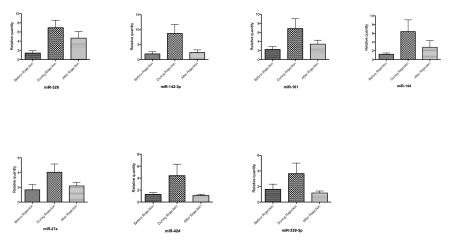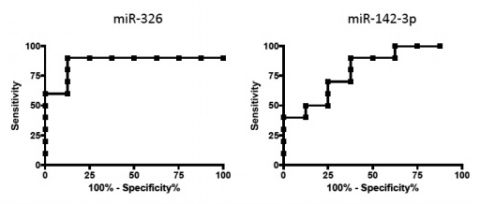Altered Serum miR-326 and miR-142-3p Profiles during Acute Rejection after Heart Transplantation
Department of Cardiology, Lund University, Lund, Sweden
Clinic of Heart Failure and Valvular Disease, Skåne University Hospital, Lund, Sweden
Meeting: 2013 American Transplant Congress
Abstract number: D1747
Introduction
Circulating miRNAs may serve the purpose as practicable non-invasive biological marker of allograft status in heart transplanted patients, as they can be detected in serum or plasma in a remarkably stable form.
Methods
We performed global miRNA expression profiling of 175 miRNAs using PCR-based serum microRNA array in serum samples of 10 heart transplanted patients before, during and after histologically verified acute rejection. The results were validated using qPCR. In our in vitro study, PBMCs were obtained from healthy volunteer donors and incubated with the human T-cell mitogen phytohemagglutinin (PHA) to detect changes in miRNAs expression in the immune cells in response to PHA.
Results
We identified seven miRNAs (miR-326, miR-142-3p, miR-101, miR-144, miR-27a, miR-424 and miR-339-3p) that were significantly overexpressed during rejection compared to before and after rejection.

In validation experiments, six of these (miR-326, miR-142-3p, miR-144, miR-27a, miR-424 and miR-101) were demonstrated to be significantly increased during rejection compared to before. MiR-326 and miR-142-3p could, contrary to the other miRNAs, significantly discriminate between normal and diseased state as determined by the histological diagnosis with area under the receiving operator characteristic curve was 0,86 and 0,80 respectively.

We found that miR-142-3p was abundantly expressed in normal human PBMCs but suppressed in cells during PHA-stimulated proliferation.
Conclusion
Our study identifies six new potential serum biomarkers of acute rejection in heart transplanted patients, and show that two of them, miR-142-3p and miR-326, can significantly discriminate between histologically verified allograft rejection and non-rejection.
To cite this abstract in AMA style:
Dewi I, Torngren K, Gidlöf O, Kornhall B, Öhman J. Altered Serum miR-326 and miR-142-3p Profiles during Acute Rejection after Heart Transplantation [abstract]. Am J Transplant. 2013; 13 (suppl 5). https://atcmeetingabstracts.com/abstract/altered-serum-mir-326-and-mir-142-3p-profiles-during-acute-rejection-after-heart-transplantation/. Accessed February 25, 2026.« Back to 2013 American Transplant Congress
